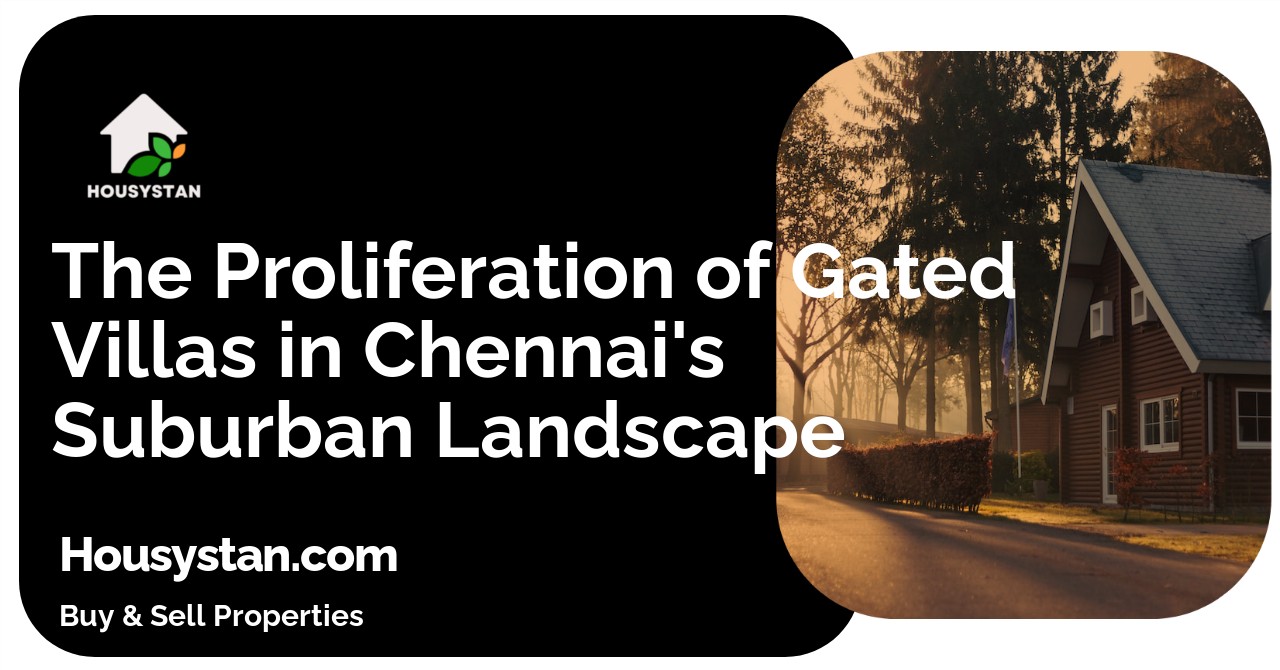The Proliferation of Gated Villas in Chennai's Suburban Landscape
Read latest blogs and articles from Housystan

The Information mentioned here was last updated on:
29/1/2026The Rise of Gated Villas in Chennai's Suburbs
Over the past decade, Chennai has witnessed significant growth and transformation. Among the most notable changes is the proliferation of gated villas in its suburban areas. This trend reflects broader changes in lifestyle preferences, urban planning, and economic dynamics.
A Brief Overview of Chennai's Suburban Expansion
- Verified Tenants/Buyers
- Unlimited Property Listing
- Zero subscription/charges fee
In recent years, Chennai's suburbs have expanded at a rapid pace. This expansion is driven by the rising demand for residential properties, improved infrastructure, and increased connectivity. As the city's core becomes busier and more congested, many residents are opting for the quieter pace of suburban life. The suburbs provide a welcome escape from the hustle and bustle, offering larger spaces and more greenery.
What Are Gated Villas?
Gated villas are residential communities that provide a blend of privacy, security, and luxury. Typically, these villas are enclosed within a secure perimeter, often featuring amenities like parks, swimming pools, gyms, and clubhouses. Gated villas offer a lifestyle that combines the benefits of both independent homes and apartment complexes.
Why Gated Villas Are Gaining Popularity
Security and Privacy
One of the primary reasons for the rising popularity of gated villas is the assurance of security. With controlled access points, 24/7 security personnel, and surveillance systems, these communities provide a safe environment for residents. The sense of security is a significant draw for families, especially those with children.
Modern Amenities
Gated villa communities often come equipped with a range of modern amenities that cater to the needs of all age groups. From fitness centers and swimming pools to playgrounds and jogging tracks, these amenities encourage an active and community-oriented lifestyle.
Community Living
The design of gated villa communities fosters a sense of camaraderie among residents. Social events, festivals, and activities are often organized within these communities, helping neighbors form strong bonds. The shared spaces within these communities promote interaction and build a sense of belonging.
Proximity to Nature
Suburban areas offer the advantage of being closer to nature, with more open spaces, parks, and greenery. Gated villa communities take advantage of this by integrating landscaping and natural elements into their design. This proximity to nature enhances the quality of life for the residents and promotes a healthier, serene lifestyle.
Economic Aspects of Gated Villas
Investment Opportunities
The real estate market in Chennai's suburbs presents lucrative investment opportunities. As urban areas become saturated, the suburbs offer a viable alternative with promising returns. Gated villas, with their appeal and amenities, often command higher resale values and rental incomes, making them an attractive investment.
Cost Considerations
While gated villas offer numerous advantages, they do come with a higher price tag compared to traditional homes. The cost of buying a villa includes not only the property itself but also shared expenses for common facilities and maintenance. Despite this, many consider it a worthwhile investment for the lifestyle benefits it provides.
Changing Demographics and Lifestyle Preferences
A shift in demographics and lifestyle preferences is another factor contributing to the rise of gated villas. The younger workforce, with increasing disposable incomes and a desire for a better quality of life, is more inclined towards modern living spaces. Additionally, the trend of nuclear families is steering demand toward homes that offer both privacy and community interactions.
Infrastructure and Connectivity
Investment in infrastructure and improved connectivity have played a crucial role in making Chennai's suburbs more accessible and attractive. New roads, highways, public transport systems, and other infrastructure projects have significantly reduced travel times from the city center to suburban areas. This development has made commuting more convenient for residents of suburban gated villas.
Real Estate Development in Chennai's Suburbs
Key Players in the Market
Several prominent real estate developers have recognized the potential of suburban areas in Chennai. They are developing large-scale gated villa projects tailored to meet the demands of modern homebuyers. These developers focus on integrating quality construction, innovative design, and sustainable practices in their projects.
Different Types of Gated Villas
Gated villas in Chennai come in various configurations and styles to cater to a wide range of preferences and budgets. From compact villas for smaller families to luxurious, expansive mansions, there's something for everyone in these communities. This diversity allows buyers to choose homes that best fit their needs and aspirations.
The Role of Technology
Modern gated villas often incorporate advanced technology solutions such as smart home systems, energy-efficient appliances, and automated security features. These technologies add convenience and enhance the living experience, making them particularly appealing to tech-savvy homebuyers.
Future Prospects for Gated Villas in Chennai
The future looks bright for the gated villa market in Chennai's suburbs. As more people seek a balance between urban convenience and suburban tranquility, the demand for such properties is poised to grow. Additionally, with ongoing infrastructure improvements and the increasing appeal of sustainable living, gated villas are set to remain a popular choice among homebuyers.
This residential trend reflects broader changes in urban living, driven by the evolving needs and preferences of the city's residents. The proliferation of gated villas is not just a real estate trend; it represents a shift towards a new way of life in Chennai's growing metropolitan landscape.